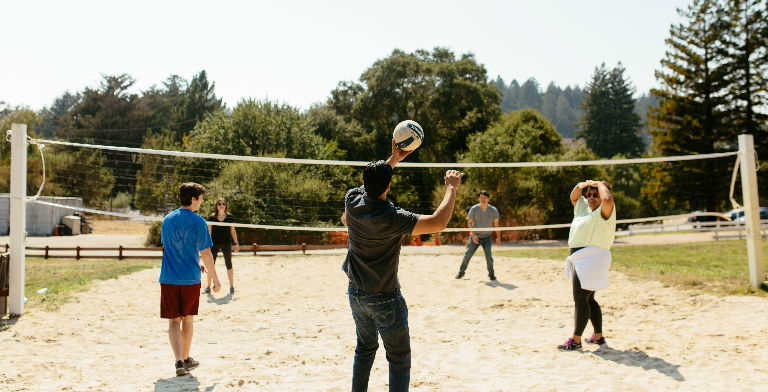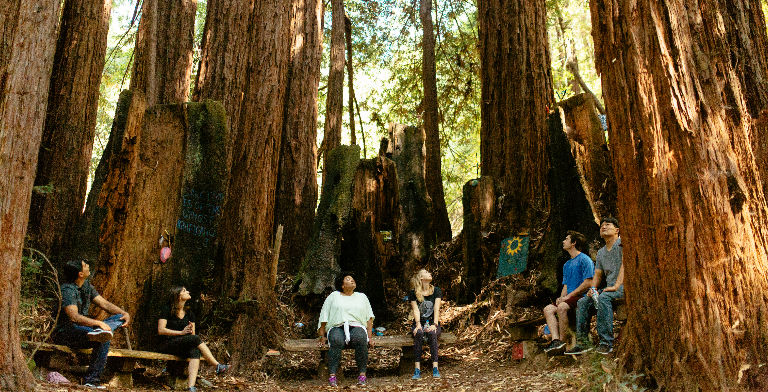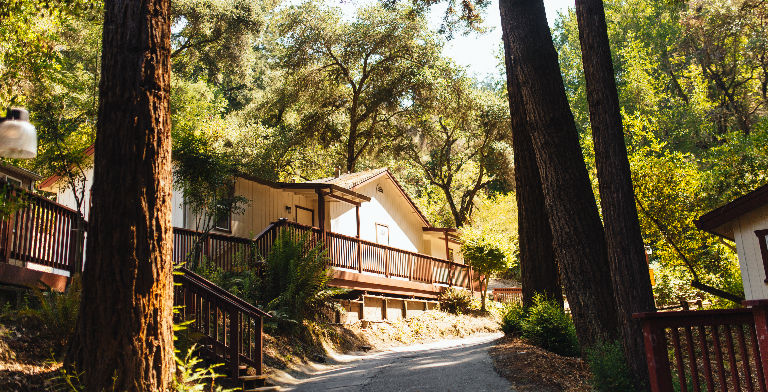The Camp Recovery Center helps adults struggling with ecstasy addiction find long-term recovery. Located near Scotts Valley & San Jose, CA, The Camp provides premier ecstasy abuse rehabilitation.
Ecstasy Abuse Rehab
Ecstasy Abuse Rehab Near Santa Cruz & San Jose
The abuse of ecstasy and other club drugs is an unfortunately prevalent problem in the United States today, especially among adolescents and young adults. Ecstasy, which is also known as MDMA, X, or molly, is a powerful psychoactive substance that is commonly abused at nightclubs, raves, dance parties, and similar venues. Ecstasy abuse gives users a sense of euphoria and emotional openness that is accompanied by increased energy, lowered inhibitions, and an enhanced sensitivity to light, touch, and sound. Though many people mistakenly believe that ecstasy can be safe when used in moderation, the truth is that ingesting any amount of this substance puts users at risk for a multitude of adverse effects.
The widespread abuse of ecstasy is a relatively recent phenomenon, but more than three decades of successful ecstasy addiction rehab experience has prepared The Camp Recovery Center to provide the life-changing residential programming that can help adolescents and adults overcome addiction to this dangerous drug. If you or someone you care about has become trapped in the destructive cycle of ecstasy abuse, the path to a healthier and more hopeful tomorrow starts with receiving treatment at a rehab center.
Helping a Loved One
Helping a Loved One or Family Member Enter Ecstasy Abuse Rehab
Knowing that a loved one is struggling with an ecstasy addiction can be a painful, frustrating, and confusing experience. But the situation is not a hopeless one. As a concerned friend or family member, you can take a few important steps that may make a world of difference in your loved one’s life:
- Educate yourself about the disease of addiction to ecstasy and the specific challenges related to ecstasy abuse. In order to best support your loved one, it is important for you to understand what he or she is experiencing.
- Research rehabilitation options. Identify treatment programs or centers that offer the type and level of care that best match your loved one’s unique needs.
- Volunteer your services. Making appointments, providing transportation, arranging for childcare, and similar assistance can be essential steps in the effort to get your loved one the treatment that he or she needs.
- Talk to your loved one. Express your concerns, share what you’ve learned about ecstasy abuse, and listen with an open mind and a compassionate heart.
- Manage your expectations. Overcoming an addiction to ecstasy is a long-term effort that will involve both successes and setbacks. Prepare to be a source of long-term support.
- Attend to your own needs. Substance abuse and addiction do not only affect the afflicted individual. You cannot be a positive presence in your loved one’s life if you are ignoring your own physical, mental, or emotional wellbeing.
Ultimately, the most important thing you can do for your loved one before, during, and after rehab or treatment is to continue to be an informed positive presence in his or her life. Share your knowledge, show your compassion, and support your loved one’s efforts to make the changes that will help him or her achieve lifelong sobriety.
Why Consider Us?
Why Those Near Santa Cruz & San Jose Should Consider Ecstasy Abuse Treatment at The Camp Recovery Center
Ecstasy abuse is associated with a wide range of short and long-term problems, including damage to users’ physical, mental, and emotional wellbeing. Immediate dangers include hyperthermia, hypertension, heart failure, and kidney failure, as well as damage associated with reckless or unsafe behaviors that result from impaired cognition and diminished inhibitions. In the days and weeks after a person has abused ecstasy, he or she may experience difficulties experiencing pleasure, reduced cognitive capabilities, sleep disturbances, and a sense of sadness, restlessness, and/or irritability. Long-term consequences of ecstasy abuse include depression, anxiety, paranoia, and potentially irreversible changes in brain structure and brain chemistry. Individuals who struggle with such challenges are at an increased risk for problems in school, at work, and within the context of their interpersonal relationships. The longer a person continues to abuse ecstasy, the greater the likelihood becomes that this behavior will have lasting negative ramifications and a profoundly negative impact on both the substance and quality of his or her life. Fortunately, those addicted to ecstasy can undergo rehabilitation at our treatment center.
Types of Treatment
Types of Ecstasy Abuse Treatment Offered at The Camp Recovery Center
Nestled in the foothills of the majestic Santa Cruz Mountains, The Camp Recovery Center is a place of hope and healing where clinically sophisticated rehab is provided in a serene and secure environment.
For more than 30 years, The Camp has remained dedicated to providing the highest quality of life-changing care to adults who are struggling with ecstasy abuse and other forms of chemical dependency. Individuals who choose to receive rehabilitation for an addiction to ecstasy at our treatment center have the opportunity to work with talented and experienced nurses, addiction counselors, family therapists, and other professionals whose clinical expertise is surpassed only by their commitment and compassion.
Rehab at The Camp is a highly personalized experience, with each resident following a plan that has been customized to ensure that we are providing the type and level of treatment that best meets his or her unique needs. The following are among the many elements that may be included in a resident’s rehab plan at our treatment center:
Detoxification: For individuals who have been unable to rid their bodies of drugs prior to arriving at The Camp, detoxification from ecstasy can be an essential precursor to full participation in treatment. When a resident is determined to be in need of detox services, we will coordinate with an offsite doctor, who will develop and approve an appropriate detox protocol. As is the case with all aspects of treatment at The Camp, detox protocols are developed and implemented in the manner that best meets the specific needs of each resident.
Medication management: Residents whose ecstasy abuse is accompanied by a co-occurring mental health condition may receive a referral to meet with a psychiatrist to determine if prescribed medication should be incorporated into their treatment plans. Residents who receive medications will meet with the psychiatrist on a weekly basis to monitor their progress and adjust their prescriptions if necessary. Members of our nursing staff also assist in monitoring residents’ medications.
Individual therapy: Residents and their case managers meet two times each week for individual therapy sessions. These sessions allow residents to process their experiences, discuss their progress, and address any concerns have arisen since the previous session.
Group therapy: Group therapy is an essential part of treatment for ecstasy dependence at The Camp. A variety of groups are scheduled every day, including weekends. Process groups are conducted five days a week. The following are examples of specific groups that may be conducted during a resident’s time at The Camp:
- Activity Group
- CBT Groups
- Detox Groups
- Experiential Group
- Focus Groups
- Music / Poetry Groups
- Men’s Group
- Women’s Group
The following are a few examples of the many topics that may be addressed in group therapy sessions for those receiving rehab for addiction to ecstasy at The Camp:
- Self-helping thinking
- 12-Step Recovery
- SMART Recovery
- Relapse prevention
Family therapy: Residents and family members have the opportunity to participate in family therapy sessions, located at our treatment center, twice each month. These sessions, which are led by marriage and family therapists, are designed to facilitate healthy communication among family members, address negative feelings and emotions, and promote the healing and strengthening of the family unit. Family therapy sessions take place on our campus near Santa Cruz and San Jose, CA.
Experiential therapy: A variety of experiential therapies are scheduled every week at The Camp. Residents also have the opportunity to spend time in our gym six days a week. Additional experiential therapies at The Camp include the following:
- Acupuncture
- Meditation
- Yoga
Community meetings: Resident-run community meetings are held every morning, including both weekdays and on the weekends. These meetings, which are a major component of the rehab process at The Camp, provide an opportunity for residents to review the agenda for the day, do readings, and address any issues that are relevant to the group. In addition to being sources of important information, community groups promote healthy independence and interdependence while also facilitating the forming of productive sober relationships that can be essential to supporting long-term recovery from ecstasy addiction.
At The Camp Recovery Center, we know that residential rehab is just one step on the path of lifelong recovery from ecstasy addiction. To ensure that every adult who completes treatment with us is best prepared for the next phase of his or her recovery, our case managers work closely with all residents to ensure that sources of continuing care and support have been identified, and all necessary arrangements for accessing this care have been made prior to discharge.
For adult residents who need a more structured level of care during their transition from residential rehab, we also offer intensive outpatient programming (IOP), convenient to those located in Santa Cruz and San Jose, CA.
In the same manner that we provide a highly personalized treatment experience during a resident’s time at The Camp, we are similarly dedicated to ensuring that, as they prepare to leave our campus, all residents have a continuing care plan that addresses the specific issues that are essential long-term recovery from their addiction to ecstasy.
















